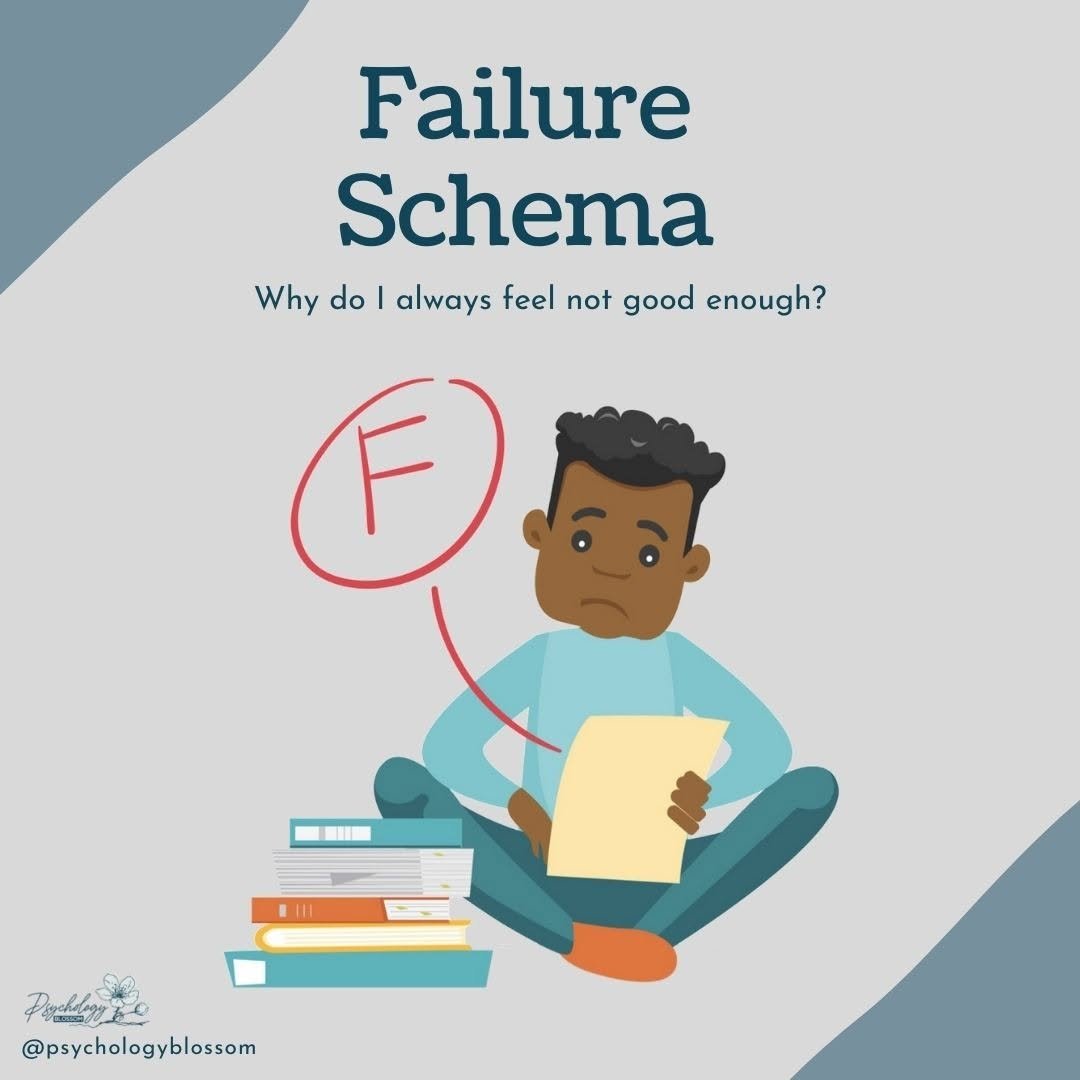Before diving into specific schemas, you might want to read our
introduction to Schema Therapy.
It provides a clear overview of the model and how schemas are understood and worked with in therapy.
Failure Schema: Breaking the Cycle of Self-Doubt and Hopelessness
Failure Schema, sometimes called Failure to Achieve Schema, causes us to expect that we will fail at everything we do simply because we feel like we are failures ourselves.
When experiencing this schema, we are often hypercritical of everything we do and highly doubtful of our ability to succeed. This pattern leads to low self-esteem and diminished self-worth, as we constantly feel incompetent or “not intelligent enough.”
People with the Failure Schema frequently describe having an inner critical voice that tells them they are not good enough. Over time, this inner dialogue shapes behaviour, leading individuals to live below their potential, often resulting in hopelessness, despair, and a sense of being “stuck.”
Typical Thoughts and Actions
- Persistent feelings of failure, regardless of accomplishments
- Constantly comparing oneself to others
- Believing one is incapable of achieving success
- Lack of self-confidence
- Chronic lack of motivation and difficulty sustaining effort
When faced with a challenging situation, an individual with the Failure Schema typically reacts in one of three ways: surrendering, avoidance, or overcompensation.
✽ Surrender
Surrendering involves approaching situations half-heartedly, as though failure is inevitable. Even when the individual recognises the importance of the task, they may not put in full effort, convinced that the outcome will be negative regardless.
✽ Avoidance
Avoidance behaviours involve sidestepping challenges altogether. By avoiding important opportunities, individuals protect themselves from potential failure. However, this also prevents growth, fulfillment, and the chance to experience success.
✽ Overcompensation
Overcompensation may involve working excessively hard, often in isolation, to prevent others from witnessing possible mistakes. This creates a cycle of perfectionism and exhaustion, as individuals overexert themselves to cover perceived inadequacies.
Development of the Failure Schema
Like many maladaptive schemas, the Failure Schema often develops during childhood. It typically arises from environments where children were subjected to constant criticism, harsh comparisons, or unrealistic expectations. These messages frequently come from primary caregivers or authority figures, and over time they become internalised.
Children raised in such settings may hear repeated statements like “You’ll never succeed” or “You’re not smart enough.” Eventually, these external criticisms turn into an inner voice of self-doubt that follows them into adulthood. This voice can profoundly influence career paths, relationships, and overall life satisfaction.
In adulthood, the schema often leads to self-sabotage. For example, individuals may decline promotions, avoid taking risks, or procrastinate on projects. They may also feel undeserving of success, attributing achievements to luck rather than their own abilities.
Effects of the Failure Schema
The effects of this schema can be wide-ranging and deeply damaging:
- Professional setbacks: avoiding opportunities, fearing leadership, or feeling unworthy of recognition
- Academic struggles: procrastination, giving up on studies, or underperforming despite ability
- Relationship issues: dependence on others for validation or sabotaging close connections out of fear of “not being good enough”
- Mental health impacts: chronic anxiety, shame, depression, or learned helplessness
Ultimately, this schema creates a cycle of self-fulfilling prophecy. Because individuals expect to fail, they either underperform or avoid challenges altogether, which reinforces their negative self-beliefs.
Healing and Overcoming the Failure Schema
The most effective treatment for the Failure Schema is Schema Therapy. This therapeutic approach helps individuals uncover the origins of the schema, challenge internalised beliefs, and reframe their sense of identity.
Schema Therapy incorporates experiential, cognitive, behavioural, and interpersonal techniques to promote deep, lasting change. Clients are guided to identify their inner critic, question its validity, and develop healthier inner voices that encourage growth and resilience.
Some common therapeutic strategies include:
- Imagery rescripting: revisiting painful childhood memories and reframing them with compassion
- Role-play exercises: practicing assertiveness and self-encouragement in safe environments
- Behavioural homework: taking small risks or pursuing manageable goals to build evidence of competence
- Reinforcement from supportive relationships: learning to accept positive feedback and celebrate accomplishments
Through this process, individuals gradually replace feelings of incompetence with a balanced and realistic self-view. They learn that failure is part of growth, not proof of inadequacy.
At Psychology Blossom, we help clients move beyond the Failure Schema by building self-worth, teaching emotional resilience, and guiding them toward achieving their true potential.
We recommend This Video to those who want to learn more about the Failure Schema.
